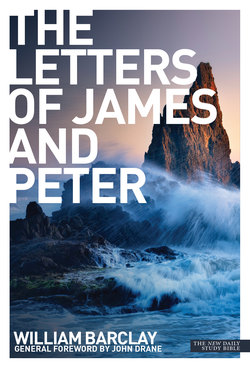Читать книгу New Daily Study Bible: The Letters to James and Peter - William Barclay - Страница 19
На сайте Литреса книга снята с продажи.
ОглавлениеAS EACH INDIVIDUAL NEEDS
James 1:9–11
Let the lowly brother be proud of his exaltation; and let the rich brother be proud of his humiliation; for he will pass away like a flower of the field. The sun rises with the scorching wind and withers the grass, and the flower wilts, and the beauty of its form is destroyed. So the rich will wither away in all his ways.
AS James saw it, Christianity brings to every individual what he or she needs. As J. B. Mayor put it, ‘As the despised poor learns self-respect, so the proud rich learns self-abasement.’
(1) Christianity brings to the poor a new sense of their own value, (a) They learn that they matter in the Church. In the early Church, there were no class distinctions. It could happen that the slave was the minister of the congregation, preaching and dispensing the sacrament, while the master was no more than a humble member. In the Church, the social distinctions of the world are obliterated, and no individual matters more than any other, (b) They learn that they matter in the world. It is the teaching of Christianity that everyone in this world has a task to do. Everyone is of use to God – and, even if someone is confined to a bed of pain, the power of that person’s prayers can still act on the world. (c) They learn that they matter to God. As Muretus the wandering scholar said long ago, ‘Call no man worthless for whom Christ died.’
(2) Christianity brings to the rich a new sense of self-abasement. The great peril of riches is that they tend to give people a false sense of security. They feel that they are safe; they feel that they have the resources to cope with anything and to buy themselves out of any situation they may wish to avoid.
James draws a vivid picture, very familiar to the people of Palestine. In the desert places, if there is a shower of rain, the thin green shoots of grass will sprout, but one day’s burning sunshine will make them vanish as if they had never been. The scorching heat is the kausōn. The kausōn was the south-east wind, the Simoon. It came straight from the deserts and burst on Palestine like a blast of hot air when an oven door is opened. In an hour, it could wipe out all vegetation.
This is a picture of what a life dependent on riches can be like. Those who put their trust in riches are trusting in things which the chances and changes of life can take from them at any moment. Life itself is uncertain. At the back of James’ mind, there is Isaiah’s picture: ‘All people are grass, their constancy is like the flower of the field. The grass withers, the flower fades, when the breath of the Lord blows upon it; surely the people are grass’ (Isaiah 40:6–7; cf. Psalm 103:15).
James’ point is this. If life is so uncertain and human beings so vulnerable, calamity and disaster may come at any moment. Since that is so, people are fools to put all their trust in things – like wealth – which they may lose at any moment. They are only wise if they put their trust in things which they cannot lose.
So, James urges the rich to cease to put their trust in the things that their own power can amass. He urges them to admit their essential human helplessness and humbly to put their trust in God, who alone can give the things which abide forever.
